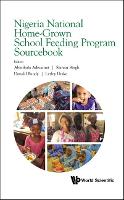


|
|
|
books
| book details |
Nigerian National Home-grown School Feeding Programme Sourcebook
Edited by Abimbola Adesanmi, Edited by Samrat Singh, Edited by Donald A P Bundy, Edited by Lesley Drake

|
This book is currently unavailable. Enquire to check if we can source a used copy
|
| book description |
School feeding is the world's most extensive safety net programme, with nearly one in two primary school children receiving a meal every school day. Over the last decade the coverage has doubled in Africa to 65.9 million school children, with the fastest rate of growth in Nigeria, up from 1.05 million in 2017 to around 10 million in 2022. Nigeria implements one of the largest school meal programmes in Africa, designed around four key principles: transparency, equity, efficiency, and sustainability. Besides providing nutritious daily school meals, the programme has created 106,000 jobs, mainly for women, and provides reliable output support for over 200,000 local farmers. It also supports the local food economy across sectors such as poultry and aquaculture by sourcing over 7.6 million eggs and 98 metric tonnes of fish products weekly.This sourcebook provides critical insights into the development, governance, and implementation of this large and complex safety net programme, led by multiple state governments and the federal government. The book, launched on 1 March 2023 at the African Union Summit on the African Day of School Feeding in Addis Ababa, is essential reading for researchers, implementing agencies, and policymakers. The editors of this book were privileged to be part of the growth of this exceptional national programme.
| product details |
Normally shipped |
Publisher | World Scientific Europe Ltd
Published date | 18 Mar 2025
Language |
Format | Hardback
Pages | 284
Dimensions | 0 x 0 x 0mm (L x W x H)
Weight | 0g
ISBN | 978-1-8006-1434-5
Readership Age |
BISAC | medical / nutrition
| other options |
|
|
|
To view the items in your trolley please sign in.
| sign in |
|
|
|
| specials |
|
|
This first comprehensive biography of Cecil Rhodes in a generation illuminates Rhodes’s vision for the expansion of imperialism in southern Africa, connecting politics and industry to internal development, and examines how this fueled a lasting, white-dominated colonial society.
|
|
Let's stare the future down and, instead of fearing AI, become solutionists.
|
|
|
|